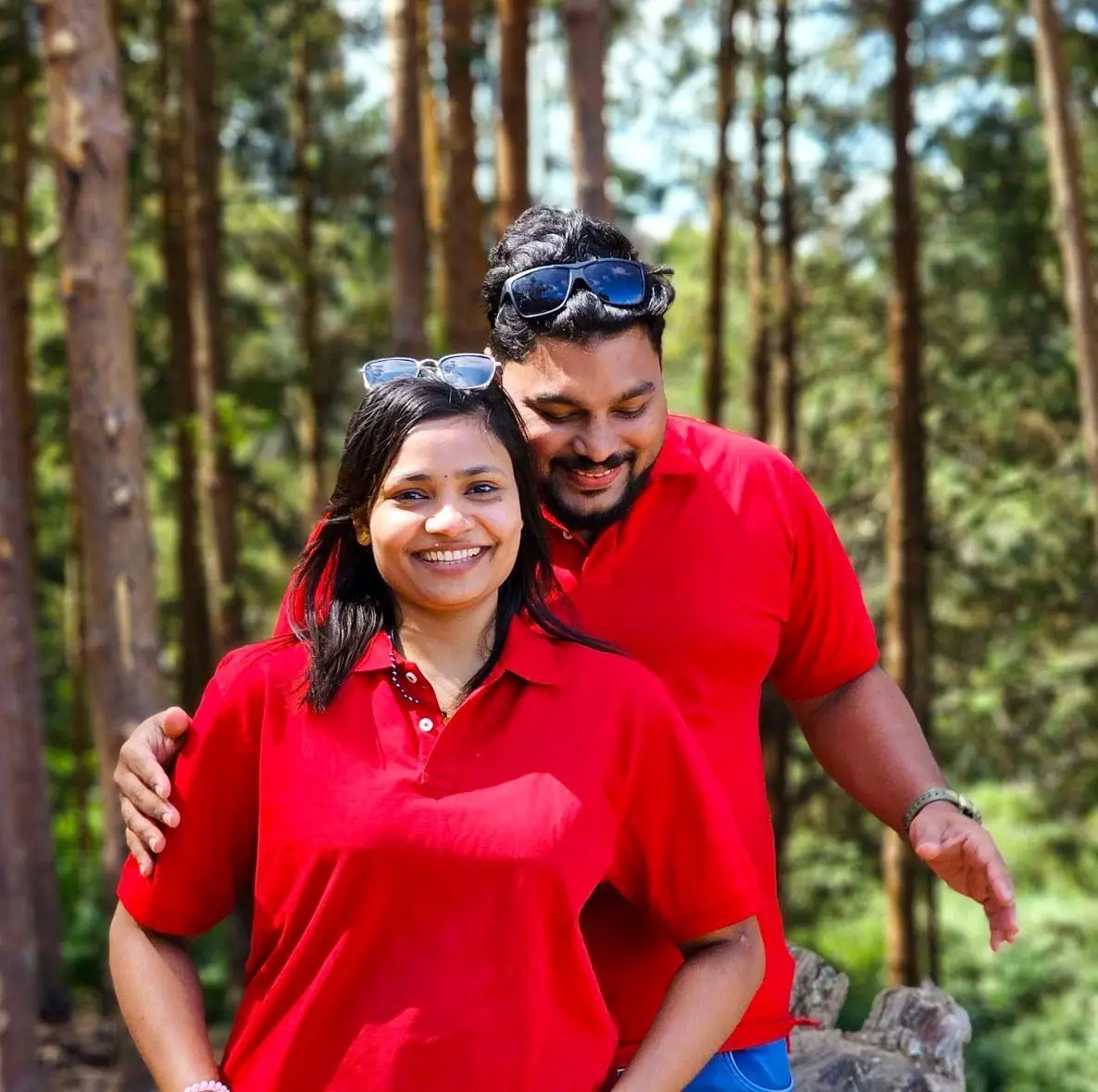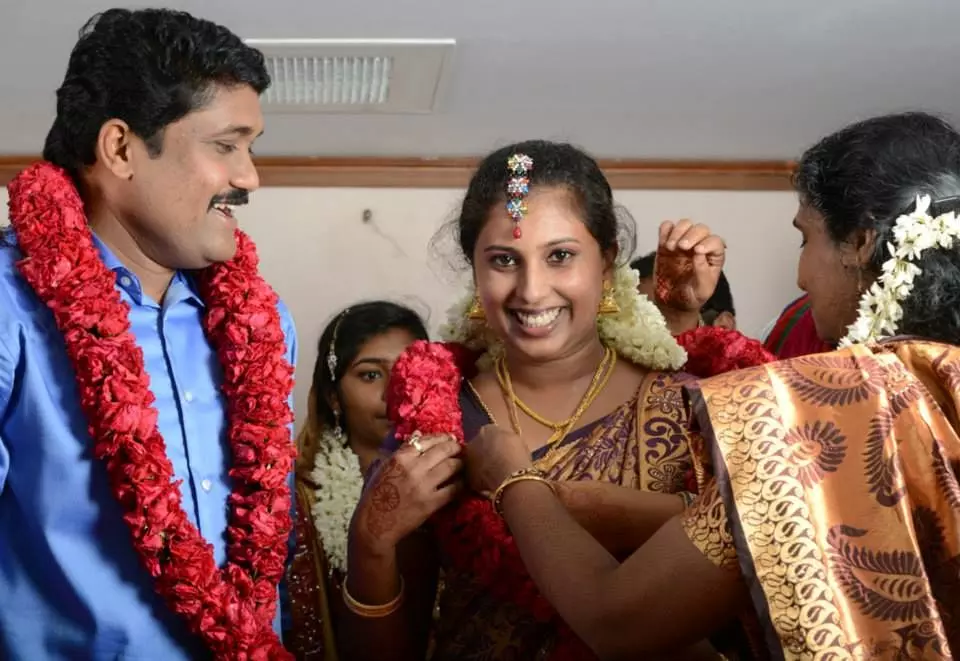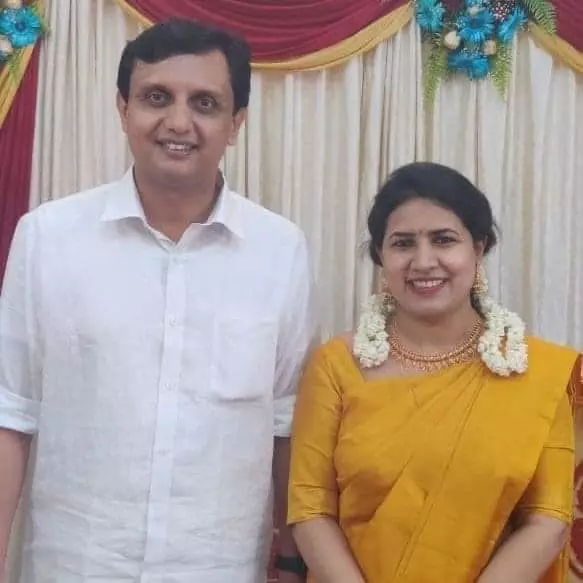
- Home
- India
- World
- Premium
- THE FEDERAL SPECIAL
- Analysis
- States
- Perspective
- Videos
- Sports
- Education
- Entertainment
- Elections
- Features
- Health
- Business
- Series
- In memoriam: Sheikh Mujibur Rahman
- Bishnoi's Men
- NEET TANGLE
- Economy Series
- Earth Day
- Kashmir’s Frozen Turbulence
- India@75
- The legend of Ramjanmabhoomi
- Liberalisation@30
- How to tame a dragon
- Celebrating biodiversity
- Farm Matters
- 50 days of solitude
- Bringing Migrants Home
- Budget 2020
- Jharkhand Votes
- The Federal Investigates
- The Federal Impact
- Vanishing Sand
- Gandhi @ 150
- Andhra Today
- Field report
- Operation Gulmarg
- Pandemic @1 Mn in India
- The Federal Year-End
- The Zero Year
- Science
- Brand studio
- Newsletter
- Elections 2024
- Events
Why despite progressive image, Kerala continues to struggle with accepting interfaith marriages
Two recent interfaith relationships have sparked a public debate, drawing the state’s ruling CPI(M) into the spotlight and highlighting a collision between the party's public stand as a champion of secularism and the personal realities of religion and family expectations.

Over the past two weeks, Kerala has witnessed two interfaith relationships spark intense public debate, each under very different circumstances, yet both drawing the state’s ruling party, the CPI(M), into the spotlight. One involved the wedding of Amal Saji, the son of CPI(M) leader S. Pushapalatha of Thiruvananthapuram, to Afeefa Tasneem, a Kochi-based doctor. Their animated “save...
Over the past two weeks, Kerala has witnessed two interfaith relationships spark intense public debate, each under very different circumstances, yet both drawing the state’s ruling party, the CPI(M), into the spotlight. One involved the wedding of Amal Saji, the son of CPI(M) leader S. Pushapalatha of Thiruvananthapuram, to Afeefa Tasneem, a Kochi-based doctor. Their animated “save the date” video, initially shared among friends, went viral on social media, transforming a private celebration into a wider political discussion.
The other case unfolded in Kasaragod, where a local CPI(M) leader reportedly opposed his paraplegic daughter’s relationship with a Muslim man. (Although her family had their own reasons for opposing the relationship. Their main concern was that the man, who had been treating her as a healer, was already married and had children.) The disagreement exposed tensions within the family over personal freedom and ideological expectations, with the daughter alleging that her father practices political ideology only outside the home but dictates choices within it.
What links these two incidents is the collision between the CPI(M)’s public image as a champion of secularism and progressive values and the personal realities of interfaith relationships. In both cases, the party found itself at the centre of debates over religion, family, and generational expectations, but in different measures.
In Amal and Afeefa’s case, the multi-pronged criticism was directed less at the couple than at the party itself. Right-wing Hindu groups accused the CPI(M) of flaunting its secular credentials and mocking religious sentiments by highlighting the image of a hijab-wearing bride. At the same time, several Muslim identity-based organisations raised a different concern, arguing that the Left tends to celebrate interfaith marriages only when the bride is Muslim and the groom belongs to another religion. To them, such unions are portrayed as victories of progressive values, reinforcing their perception that Muslim women are being drawn away from their faith under the guise of secularism.
Also read: Despite laws, why inheriting parental property remains a challenge for women
In April 2022, Joisna Mary Joseph, a nurse working in Saudi Arabia, returned home to Kozhikode on leave and soon went missing. Her family later learned that she had left with her partner, Shejin MS, a Muslim and an active CPI(M) worker. Soon after, the local parish at Kodenchery organised a protest march to the police station, accusing Shejin of “love jihad”. It was the first such open demonstration by the Church in Kerala, with even nuns joining the protest.

Shejin MS and Joisna Mary Joseph. By special arrangement
CPI(M) leader and former MLA George M Thomas backed the Church’s stance, but the party distanced itself from him and stood with Shejin. Now, Muslim identity groups are reviving the episode, alleging that the CPI(M) eventually abandoned Shejin, a claim he strongly denies. Shejin and Joisna continue to live together, with her remaining a practicing Christian, while he identifies as an atheist.
“After our wedding, we felt even more closely connected to the leaders and members of both the party and the DYFI [Democratic Youth Federation of India],” Shejin said in a social media post last week. “My party has always given me recognition and opportunities beyond what I deserve, both then and now. At the time of my marriage, I was serving as a member of the Kannoth local committee and I continue to work in the same capacity even today. Through all our joys and struggles, my party and its leaders have stood firmly with us”.
All these cases reveal not only the realities of interfaith marriages in Kerala but also the increasingly blurred line between communalism and religiosity. On the surface, the state appears secular, with the Left in power and even the Congress positioning itself as left-of-centre, while the BJP has largely been kept at bay. Yet a closer look into private and family spaces shows a society that remains subtly, but deeply, conservative in its outlook.
Kerala may not have experienced a strong Ambedkarite or self-respect marriage movement [which propagates marriage based on social equality and personal freedom] like Tamil Nadu, yet there has long been a noticeable pattern of interfaith and inter-caste marriages within its political circles. From the early days of the Left, leaders such as KR Gowri Amma of the CPI(M) and TV Thomas of the CPI set precedents by marrying across community lines. Similar alliances have continued across parties — Vayalar Ravi and Mercy Ravi in the Congress, Annie Raja and D Raja in the CPI, and among later generations of leaders including PWD Minister Mohammed Riyas and Veena T, daughter of Chief Minister Pinarayi Vijayan, LSGD Minister MB Rajesh and R Ninitha and Rajya Sabha member AA Rahim and Amrutha, to name a few. While not widespread or driven by social movements, these unions reflect a quiet acceptance of personal choice and ideological alignment taking precedence over caste or religious identity in Kerala’s political culture.
The most dramatic and almost fiction-like account of an interfaith relationship in the history of the state was from the first cabinet between KR Gowri Amma and TV Thoams, the communist MLAs from Alappuzha district who were deeply in love long before the party came to power in 1957. When the Communists formed the government, it was the party that insisted they marry, despite Thomas having had an earlier relationship and a son from it. It was a rare and dramatic blend of love, ideology, and sacrifice. However, their union could not survive the ideological divide that followed the 1964 split in the Communist Party. Gowri Amma, unwavering in her political convictions, chose to side with the CPI(M), while Thomas remained with the CPI. The separation marked the end of their personal relationship, but also illuminated Gowri Amma’s commitment to her political ideals over personal ties. Both ministers in the 1967 government, Gowri Amma was allotted official residence, Xanadu and Thomas at Rose House, which is in the same courtyard, separated by a wall.
“We literally tore down the wall between our two houses and built a door to connect them. But the CPI closed that door, which came as a tremendous shock to me. That closed door ended up separating us,” Gowri Amma recalled in her autobiography.
“In today’s India, it’s hardly surprising that every interfaith marriage makes headlines, even in Kerala,” said AA Rahim, Rajya Sabha member of the CPI(M).
He added: “The growing divide between communities and the hatred that fuels it stem from the Islamophobia spread by right-wing forces. Communal divisions have become rampant even in a state like Kerala, and their presence has become more visible in recent years. But this is not something new, it existed even a decade ago. When Amrutha and I got married, both of us received poison-pen letters from fanatics on both sides. Now, with platforms like WhatsApp, the hostility has only become more widespread. Kerala cannot remain insulated from the rest of India. Even our children, who are studying in Delhi, face questions rooted in religious bias.”

Rajya Sabha member AA Rahim and his wife Amrutha, on their wedding day. By special arrangement
Even choosing to pursue an interfaith relationship is often a matter of privilege, with support from the party or community playing a decisive role. Those without such backing frequently fall through the cracks, as love affairs are forced to end and arranged alliances that cross religious or caste lines remain absolutely out of question.
For instance, Mohammed Riswan*, a 36-year-old sound engineer, and his partner Shubharaga*, 35, an illustrator, both from the Malabar region of Kerala, have been living together as a family in the middle east for the past ten years. The two met while working in Kochi and fell in love, a relationship that drew disapproval not just from their families but also from their respective communities. Their affair came to light when some of Shubharaga’s neighbours discovered it during the peak of the Love Jihad controversy in Kerala (around 2015), and put it up on social media, forcing the couple to flee.
“The interesting thing is that neither of us ever led a religious life. We were both atheists and that was what initially brought us together when we met in Kochi,” recalled Shubharaga, whose family has a communist background and several party (read CPI-M) activists among close relatives.
Riswan added: “I was deeply involved in student politics and leaned towards leftist ideology, though I was never formally part of any organisation. But I had assumed that since her family members were party workers and even leaders, things would be easier for us, but that turned out not to be the case.”
The couple, currently in Kerala on vacation, can now look back and laugh about that period, but at the time, the tension was very real. Interestingly, it was a local Communist Party leader who advised them to leave town, cautioning that confronting the situation could easily spiral out of control.
“In fact, Kerala is also a caste-driven society. Inter-caste and interfaith marriages have always been exceptions; endogamous marriages remain the norm. In the seventies and eighties, the Left’s progressive space allowed some of these unions to take place, what we called love marriages, and they were recognised as such, particularly when they crossed caste or faith lines. They had a community, often the party itself, and sometimes marriages were even held at party offices. But those spaces have gradually shrunk”, opined Dr Binitha V Thampi, Professor IIT Madras.
Added Dr Binitha: “With the BJP’s rise to power, there has been a renewed emphasis on tradition, though elements of this were always present among the upper castes, even among so-called progressives. Now, with matrimonial sites reinforcing caste boundaries, endogamous marriages are cemented further and the space for progressive unions continues to erode. The current transition is being driven by hostility toward ‘the other’, with Islamophobia playing a particularly significant role among Hindus and Christians.”
Also read: 20 years of the RTI law: How a marquee legislation has been weakened and diluted
According to Dr Arathi PM, faculty at the School of Indian Legal Thought, Mahatma Gandhi University, Kottayam, Kerala’s political public sphere “may appear secular and anti-communal”, but “private and familial spaces have never reflected the same ethos”. “Even the public sphere’s secularism carries a subtle Hindu undertone. The private sphere has historically been reactionary, guarding patriarchal, religious, and caste boundaries, a tendency clearly reflected in the family as an institution. There is a kind of structural weakness in Kerala society that it can maintain the public space and private familial space as two water-tight compartments,” Dr Arathi added.

PWD Minister Mohammed Riyas is married to Veena T, daughter of Chief Minister Pinarayi Vijayan. By special arrangement
Many social scientists and political commentators believe that the term “Love Jihad” and the propaganda surrounding it have had a profoundly negative impact on interfaith relationships, particularly those involving Muslims.
“What we can see is that interfaith marriages appear to be declining, and education has not supported progressive unions; in some cases, it has even reinforced conservative and reactionary attitudes. Rising religious animosity and hatred have pushed institutionalised faiths, whether Christianity, Islam, or now even Hinduism, increasingly organised around temples, to become more rigid, and this has also contributed to the shrinking space for interfaith alliances,” said Dr. Arathi.
At the peak of the so-called “Love Jihad” controversy, Kerala saw a troubling pattern of right-wing vigilante groups targeting interfaith couples intending to marry under the Special Marriage Act. Personal details of these couples were circulated online, often accompanied by alarmist claims of “conversion conspiracies”, serving as both public shaming and a form of communal intimidation.
In many cases, families, influenced by the surrounding hysteria, intervened forcibly to stop the marriages. Young women were sometimes taken away from their partners, and several cases ultimately reached the courts as couples sought legal protection for their right to choose.
While Hindu extremist groups used the “Love Jihad” narrative to portray Muslim men as aggressors, Islamic fundamentalist groups employed similar coercive tactics against women from their own community who pursued relationships with non-Muslims. In this way, both sides, driven by patriarchal and sectarian anxieties, deployed faith and morality as tools to police love and personal autonomy, leaving young couples trapped in the crossfire of ideological extremism.
“For us, even today, marriage is not seen as a union between two individuals but as a bond between two families and that creates immense pressure. Our literature and cinema continue to reinforce this idea, adding to the burden. Moreover, we remain deeply influenced by religion, which fuels anxieties about children’s future — particularly the question of which faith they will be raised in. Even those who do not actively practice any religion are shaped and constrained by it. It’s a form of social conditioning that persists regardless of education or modernity", said Malayalam poet Sereena.
Once hailed as an aspiring secular society shaped by the Renaissance, Left movements, and progressive spaces, Kerala now seems to be moving backward culturally. The optics present a secular and literate image, but beneath that facade lies a society that continues to embrace conventions and conservatism. The news value attached to sporadic interfaith relationships is a symptom of this underlying tension.
* Some names have been altered to protect the anonymity of the individuals involved.
